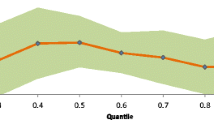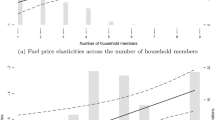Abstract
Focusing on travel survey data from Germany, this paper investigates the determinants of automobile travel, with the specific aim of quantifying the effects of fuel prices and fuel economy. The analysis is predicated on the notion that car mileage is a two-stage decision process, comprising the discrete choice of whether to own a car and the continuous choice of distance traveled. To capture this process, we employ censored regression models consisting of Probit and OLS estimators, which allows us to gauge the extent to which sample selectivity may bias the results. Our elasticity estimates indicate a significant positive association between increased fuel economy and increased driving, and a significantly negative fuel-price elasticity, which ranges between − 35% and − 41%. Taken together, these results suggest that fuel taxes are likely to be a more effective policy measure in reducing emissions than fuel-efficiency standards.
Similar content being viewed by others
References
Becker GS (1965) A theory of the allocation of time. Econ J 75: 493–517
Binswanger M (2001) Technological progress and sustainable development: what about the rebound effect?. Ecol Econ 36: 119–132
Dow WH, Norton EC (2003) Choosing between and interpreting the Heckit and Two-Part Models for corner solutions. Health Serv Outcomes Res Methodol 4: 5–18
Duan N, Manning W, Morris C, Newhouse J (1984) Choosing between the Sample-Selection Model and the Multi-Part Model. J Bus Econ Stat 2: 283–289
EC (European Commission) (2007) Accompanying document to the PROPOSAL FROM THE COMMISSION TO THE EUROPEAN PARLIAMENT AND COUNCIL for a regulation to reduce CO2 emissions from passenger cars, Impact Assessment, COM(2007)865 final, SEC, 2007, p 1724
Frondel M, Peters J, Vance C (2008) Identifying the rebound: evidence from a German Household Panel. Energy J 29(4): 154–163
Goodwin P, Dargay J, Hanly M (2004) Elasticities of road traffic and fuel consumption with respect to price and income: a review. Transp Rev 24(3): 275–292
Greene DL, Kahn JR, Gibson RC (1999) Fuel economy rebound effect for U.S. household vehicles. Energy J 20(3): 1–31
Greening LA, Greene DL (1997) Energy use, technical efficiency and the rebound effect: a review of the Literature. Report to the Office of Policy Analysis and International Affairs, US Department of Energy, Washington, DC
Hay J, Olsen R (1984) Let them eat cake: a note on comparing alternative models of the demand for medical care. J Bus Econ Stat 2: 279–282
Heckman J (1979) Sample selection bias as a specification error. Econometrica 47: 153–161
King G, Honaker J, Joseph A, Scheve K (2001) Analyzing incomplete political science data: an alternative algorithm for multiple imputation. Am Polit Sci Rev 95: 49–69
Lueng SF, Yu S (1996) On the choice between sample selection and Two-Part Models. J Econom 72: 197–229
MiD (Mobilität in Deutschland) (2008) German Federal Ministry of Transport, Building and Urban Affairs. http://www.kontiv2002.de/publikationen.htm
MOP (German Mobility Panel) (2007) http://www.ifv.uni-karlsruhe.de/MOP.html
Small KA, Van Dender K (2007) Fuel efficiency and motor vehicle travel: the declining rebound effect. Energy J 28(1): 25–52
Sorrell S, Dimitropoulos J (2008) The rebound effect: microeconomic definitions limitations, and extensions. Ecol Econ 65(3): 636–649
Sterner T (2007) Fuel taxes: an important instrument for climate policy. Energy Policy 35: 3194–3202
Walker IO, Wirl F (1993) Asymmetric energy demand due to endogenous efficiencies: an empirical investigation of the transport sector. Energy J 14: 183–205
West SE (2004) Distributional effects of alternative vehicle pollution control policies. J Public Econ 88(3-4): 735–757
Author information
Authors and Affiliations
Corresponding author
Rights and permissions
About this article
Cite this article
Frondel, M., Vance, C. Do High Oil Prices Matter? Evidence on the Mobility Behavior of German Households. Environ Resource Econ 43, 81–94 (2009). https://doi.org/10.1007/s10640-008-9246-4
Received:
Accepted:
Published:
Issue Date:
DOI: https://doi.org/10.1007/s10640-008-9246-4




